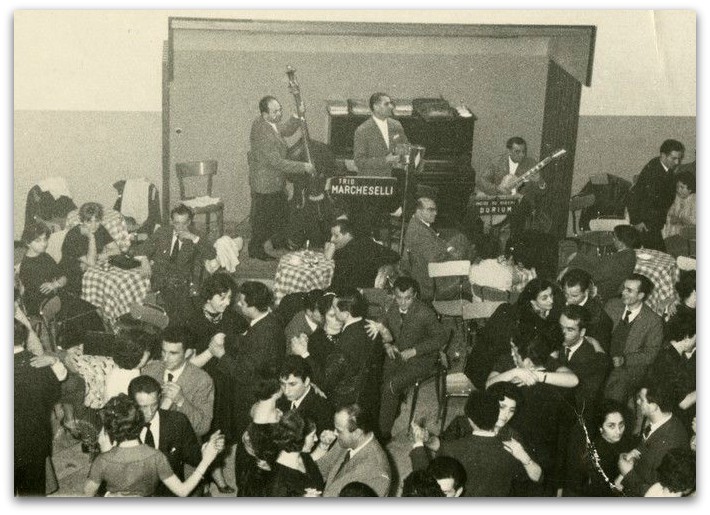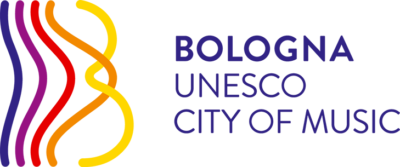Popular music in Bologna
A brief summary
In popular music Bologna boasts a solid tradition of dialect song and the authorship of a real musical and dance style: the filuzzi, interpretation of the Romagna ballroom dance, distinguished by the peculiar use of the Bolognese accordion; among the most important performers we can't not cite Leonildo Marcheselli and Ruggero Passarini. Bologna and its territory can also claim the authorship of a real musical instrument: in 1853 the ocarina of Budrio was invented, a popular terracotta instrument which is world wide known.
Bologna is one of the first Italian cities to spread the culture of jazz by hosting the prestigious Bologna Jazz Festival, giving birth to bands such as the Doctor Dixie Jazz Band and creating clubs with a vivid and still uninterrupted concert activity such as the Cantina Bentivoglio; Henghel Gualdi, Marco Tamburini, Marco di Marco, Piero Odorici, the Collettivo Bassesfere, Paolo Fresu and the American Steve Grossman are just a few remarkable musicians born or adopted by the city. In 2011, just in the place where Alberto Alberti founded his Disclub, La strada del jazz began to be one of the unmissing appointment of the city: it consists in a 3-day Jazz performances and in the laying of marble stars in the pavement dedicated to the great interpreters who played in the city.
Bologna boasts a great tradition in pop music, so much that we can legitimately speak of a real "Bolognese scene" which is still active and influential. It includes renowned recording studios such as Fonoprint, native born artists such as Lucio Dalla, Gianni Morandi, Claudio Lolli , Luca Carboni, Cesare Cremonini, Angela Baraldi, Andrea Mingardi, the Stadio and Dino Sarti or artists by adoption as Francesco Guccini, Biagio Antonacci, Samuele Bersani and Vasco Rossi. Without forgetting other highly successful artists such as Nilla Pizzi, Giorgio Consolini, Raffaella Carrà, Dodi Battaglia of the Pooh, the Lùnapop and the producers Mauro Malavasi and Celso Valli.
Bologna does not neglect music for children: it is home to the international children's song festival "Lo Zecchino d'Oro" and the birthplace of Cristina D’Avena, in earlier times competitor of the festival, and later the greatest Italian interpreter of children's songs.
At the end of the '70s Bologna hosts a brand new musical panorama, linked to the experiences of the youth movements and to the protest: bands like Skiantos - standard bearers of "comedy rock" – and Gaznevada, labels such as Attack Punk and Italian Records, redefine the Italian rock scene. In the following years the city maintains the ability to make rock bands with an original character debut (i.g. Massimo Volume and Stato Sociale), consolidates and develops a circuit of important live clubs such as Estragon, Covo, Locomotiv and Freakout and welcomes big concerts at the Unipol Arena, the largest and most modern complex for events in Italy.
Since the late ‘80s, Bologna has been standing out as an Italian outpost for hip hop culture, hosting places like the Isola nel Kantiere community center, labels like Century Vox and musicians like Joe Cassano, Sangue Misto and Neffa.
During the '90s Bologna has been one of the first Italian cities to become an important center of gathering and diffusion for electronic music, club culture and experimentation linked to new technologies, hosting venues such as Link, Livello 57 and TPO, festivals such as Distorsonie and labels such as Irma Record. Netmage - later transformed into Live Arts Week - was born in 2001, whereas Robot -international events dedicated to electronic music and digital arts - in 2008.
At the end of the last century, Bologna also became a reference center for highly popular initiatives by organizing the Street Rave Parade and hosting, at the Joe Strummer Arena, major international festivals such as Independent Days, MTV Days and Bologna Sonic Park.
With the new millennium, Bologna stands out for the presence in the city of numerous musicians, agencies, labels and operators in the sector, a solid circuit of live clubs, historic concert halls and large outdoor venues that host artists of all musical genres and styles, important devoted public institutions and international important festivals linked to rock, jazz, electronics or contaminated and devoted to the contemporary. Bologna thus strengthens its vocation as a dynamic and creative city, capable of combining tradition and innovation both in the offer and in the analysis of musical contents, with an unchanged and constant ability to attract and welcome professionals and music lovers from all over Europe.
The history of popular music in Bologna from 1945 to nowadays will be object of the coming soon La Sala della Musica.

